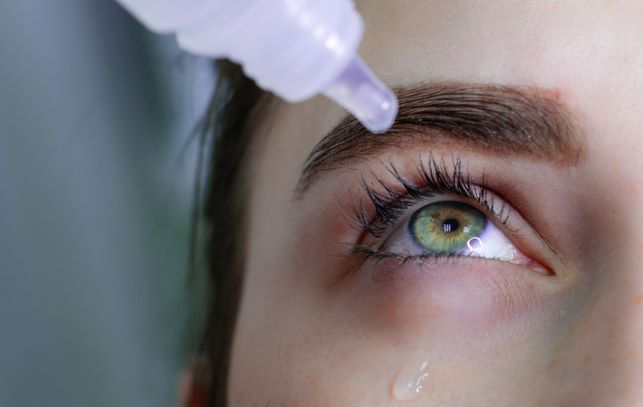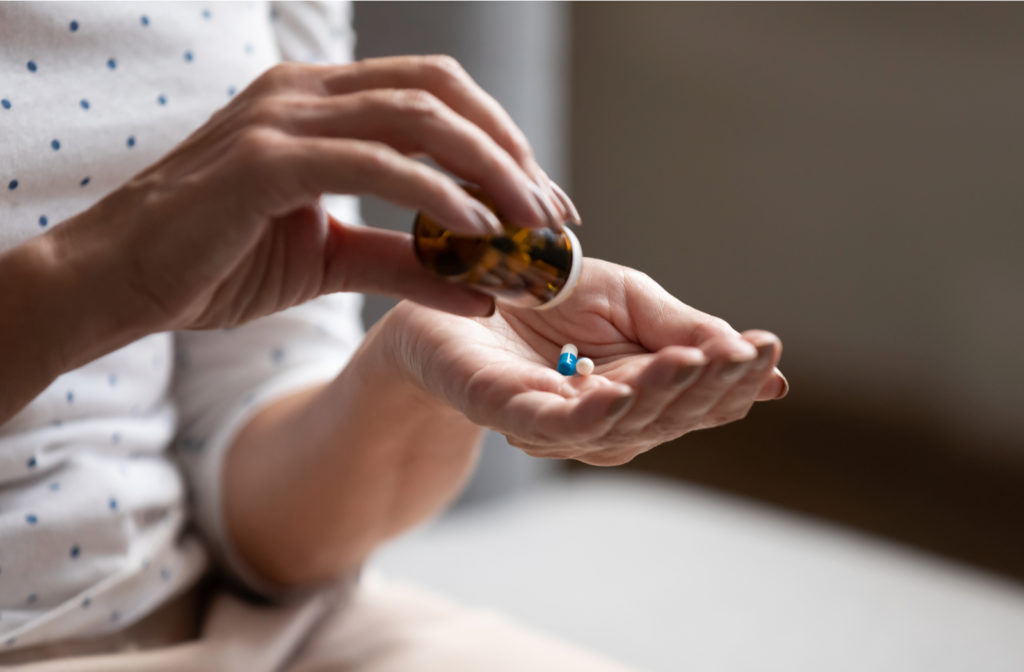Dry eyes are uncomfortable, but knowing the causes, signs, and symptoms can help you stop it in its tracks.
If you think your medication is the reason for your dry eyes, treatment options are within reach. Talking to your optometrist about your lifestyle and medical history can be the next step in making the uncomfortable, comfortable again.
What is Dry Eye Disease?
Dry eye occurs when your eyes don’t make enough tears or your tears dry up too quickly. Normally when you blink, a tear film covers your eye to help it stay moist. This is made up of 3 layers:
- Mucous layer
- Watery layer
- Oil layer
The lacrimal and meibomian glands produce the tear film. If something affects one or more layers of the tear film, like these glands being blocked or damaged, it can result in dry and irritated eyes.
Medications That Can Affect Dry Eyes
Acne Medication
Isotretinoin is a medication used to help treat cystic acne. It works by decreasing the amount of oil production in your face. Some of these oil glands are in your eyelid, which can lead to less oil in your tears.
Antidepressants, Parkinson’s Disease Medications, & Sleeping Pills
These 3 medications have something in common: they block some signals between nerve cells. Blocking nerve cells is important for what each medication treats, but can also stop the signal telling you to produce more tears.
Antihistamines
If you have allergies, antihistamines feel like a lifesaver. Histamines cause your nose to swell, and your eyes and nose to run and itch. An antihistamine blocks your body’s histamine receptors, but this can also mean you produce fewer tears as a result.
Birth Control Pills & Hormonal Replacement Therapy
The hormonal influence of birth control pills can cause changes in estrogen levels. The change in levels can affect the meibomian gland which produces the oily layer of your tear film. A lack of oil can mean your tears evaporate too quickly. If your tears don’t stick around long enough, it can lead to dry eyes and irritation.
Doctors may suggest hormone replacement therapy during menopause, as it is one of the most effective treatments for menopause symptoms. A low dose of estrogen is most commonly taken as a pill or worn as a patch on the skin. Similar to birth control pills, changing levels in estrogen can affect the eye’s oil glands. As a result, the makeup of your tears lack oil and can dry up too quickly.
Blood Pressure Medications
Beta-blockers and diuretics are common types of blood pressure medication.
Beta-blockers block your body’s response to the hormone adrenaline. Your heart rate lowers and the force your blood puts on your arteries decreases. This can also lower the normal pressure in your eyes, which can lower the amount of water in your tears.
Diuretics help rid your body of salt and water, which can change the makeup of your tears. Because you have less fluid in your blood vessels, the pressure in your eyes also decreases and lowers the amount of water in your tears.
Decongestants
When you have a stuffy nose, a decongestant can help you out. A decongestants job is to shrink swollen blood vessels and tissues to help you breathe. But much like an antihistamine, they can cause a lack of tear production.
Pain Relievers
It is not as common, but some pain relievers known as nonsteroidal anti-inflammatory drugs (NSAIDs), such as Ibuprofen, can cause dry eyes. NSAIDs can block your body’s production of certain natural substances and cause you to feel the effects of dry eye.

Treatments & Solutions
If you think a medication you are taking is the cause of your dry eyes, it is important to talk to your eye doctor about your medical history and what solutions might work best for you.
Depending on how serious your symptoms are, treatments your eye doctor may suggest include:
- Over the counter eye drops – you can get these without a prescription to help keep your eyes moisturized
- Prescription medication – if your dry eye is more serious, prescription medicine can help your eyes produce more tears
- Punctal plugs – if your tears are draining too quickly, these plugs help keep tears in your eyes
- Surgery – This solution is not the most common, but if your eyelids are too loose tears can drain too quickly from your eyes. Surgery can help keep tears stay on your eyes.
If you think your symptoms are caused by environmental or lifestyle factors, you may want to think about:
- Avoiding smoke, wind, & air conditioning
- Using a humidifier
- Monitoring your screen time
- Drinking more water
- Getting enough sleep
Aurora 2020 can help find the right dry eye solution for you or your family.



